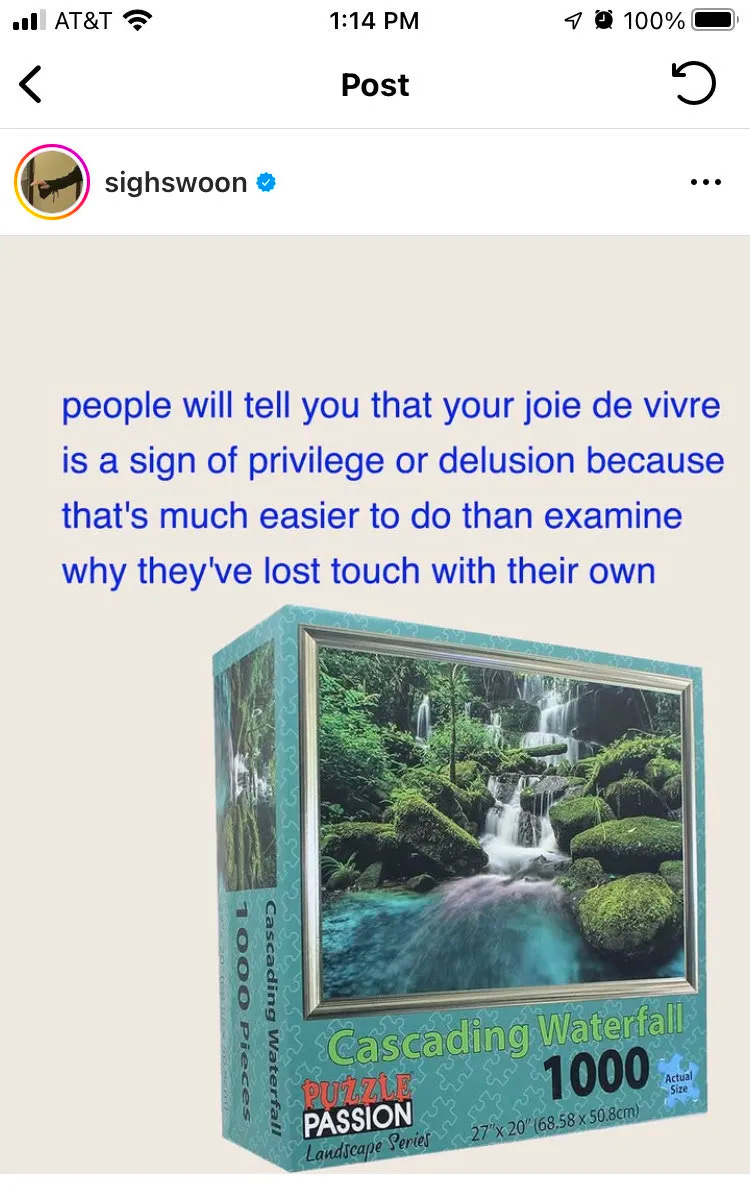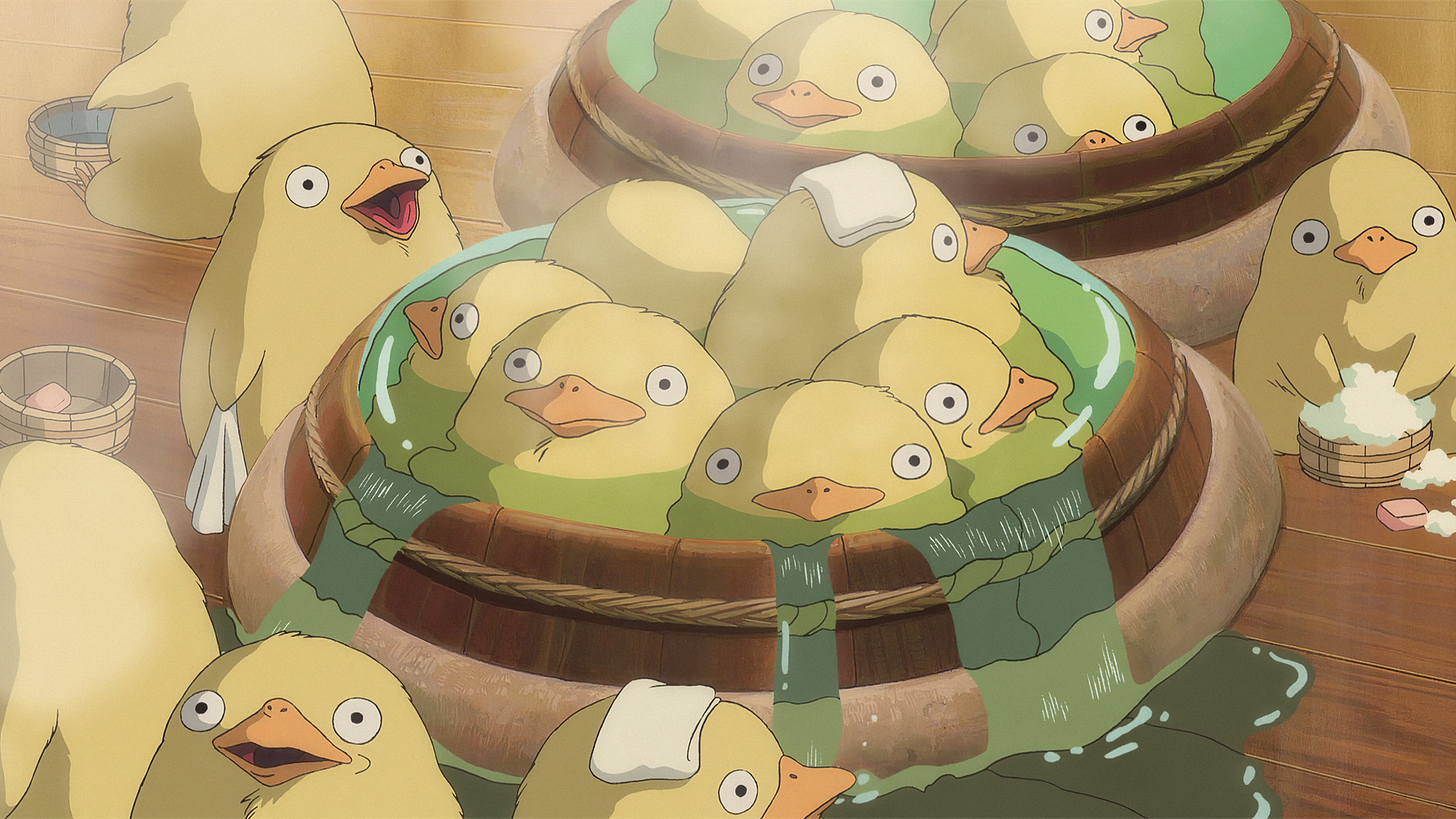Postcard: Whimsy
No. 009 - on levity and suffering.
Postcard is a weekly curation of things I think are beautiful or interesting. Each postcard will be named after a word and contain something to listen to, something to look at, and something to think about. I welcome you to share any thoughts in the comments. Thank you!
Postcard: Whimsy
whimsy:
(n.) Playfully old-fashioned or fanciful behavior or humour.
(n.) A fanciful or odd thing.
(n.) A whim.
(n.) A merry-go-round, roundabout. (Obsolete)
†Meanings from the Oxford English Dictionary (OED)
Something to listen to:
Something to look at:
Continuing my recent personal Studio Ghibli kick, here’s an appropriately whimsical still from Spirited Away.
Something to think about:
This week, I’ve mostly been feeling light and breezy. I find that, like the moon, I ebb and flow between generation and regeneration in both my personal and creative life. Lately I’ve been regenerating on all fronts. When my energy is low, I like to try and give myself space to just be low energy. After a while, the creative urge builds and I find I once again have something to say or an idea to play with.
Today, I want to extoll the virtue of whimsy. Every tiny interaction in life is an opportunity to practice whimsy. You can be playful with friends and family, you can be playful with strangers and animals. Do banter with a shopkeeper. Or a stranger on the bus. Make someone’s day. In attempting to do so, you also invite them to surprise you too and make your day back. How delightful!
You can even be more playful with how you think and talk about yourself. A theme that has emerged over and over again in my conversations with people about culture and happiness is how brutally tough people tend to be on themselves. When it comes to the origins of modern unhappiness, many times the call is coming from within the house, the murderer is already in the building. The first order of business is helping people love themselves like they love others, and getting people to beat themselves up even a little bit less is basically the gateway drug to that end goal.
In my own case, becoming more whimsical in the way I dialogue with the voice in my head significantly improved my relationship with myself. Self-love doesn’t always have to be hard, it turns out, and it got easier for me when I started deliberately cultivating a safe, fun, playful environment for all the parties involved (me, myself, and I).
Am I a totally worthless idiot because I forgot to do a task… or was I just saving the supreme joy of “getting to do something” as a gift for my future self? Am I a bad person because someone honked at me at a traffic light… or was I just bringing a little bit of levity and chaos into the driving experience for us all?
Humor is a wonderful thing in general. I view my own sense of humor as one of my greatest gifts (if I am not actually funny, please keep that thought to yourself at this time, thank you please). As in many cases, it is a gift born out of pain. The reason I am funny is because I suffered a brutal social exile when I was in middle school and so I learned how to be funny as a way to get people to like me in the future. (So now you have to also feel a little bit sad whenever I’m being funny. Like right now.)
Humor as a socializing tactic worked, but there was something misaligned and maladaptive about the way it functioned for me; like I was not worthy of love if I was not making people laugh. Needless to say, I have an intimate understanding of why the clown is sad.
It took me a long, long while to come to terms with this. After all, the point of our defense mechanisms is that they are automatic, operating on the subconscious levels of our spirits. There was a version of me that was fundamentally insecure; I did not know who I was as a person, I did not trust myself. For this me, humor was the ultimate defense mechanism: a way of pushing a conversation back towards the surface and away from depth, away from earnestness or vulnerability. Many things are easier to laugh about than to actually talk about. Comedians know this to be true and the risks of the power they wield.
Thankfully, I now have more awareness of both this pattern of behavior and what it feels like in the moment to reflexively grasp for humor when I am feeling uncomfortable. As I’ve become more comfortable with who I am and grown into my core constitution and the sense of self that provides, I’ve found I can instead sit with discomfort instead of retreating to humor; that the discomfort will not annihilate me. And even if it did, I would regenerate.
For me, the trust in regrowth is rooted in my faith in God. I know that God and the universe flow into and out of us constantly, with each breath of air, every circuit of blood coursing through our veins. Life is a never-ending cycle of moving between decay and regeneration. The way it is meant to be.
My gift of humor is now something I’m closer to peace and harmony with. It’s a powerful thing I can draw on, when I want to or for the benefit of others, but I don’t need to leave it stuck on automatic. Cruise control is for catching a quick nap while you’re on the highway, not how you move through life and relate to people.
Now, just because something comes from pain like my sense of humor did doesn’t mean it is a bad thing, of course. Many terrible people have children who turn out lovely. Every stormy cloud has its silver lining. But I do want to make a distinction here. The idea that “suffering is necessary” is one of the more pervasive lies in our default culture. Americans worship suffering. “No pain, no gain,” as the saying goes. We valorize suffering because it gives us a story, a narrative; a way to make sense of difficult experiences.
Making meaning out of your suffering or drawing out the wisdom in its lesson is a good thing. But confusing your suffering for the source of the meaning (or even worse, the meaning itself) and deliberately seeking more of it is bad. Meaning is everywhere. You don’t need to suffer to be happy, you don’t need to suffer to know the truth or recognize beauty when you see it. Too many people suffer just because they think they’re supposed to, or because they saw how someone else suffered and walked away from the experience with a story. I regret the many times I have made this mistake myself.
A friend of mine once said with an aching directness, “My curiosity has led me to a lot of really painful places.” Curiosity can indeed lead you into the dark, and our hungering desire to find deeper meaning can easily lead to self-inflicted suffering in a world where it often feels like we are drowning in a shallow culture of moral relativism. There is nothing inherently virtuous about suffering.
My friend and I both emerged from our suffering with stories, but the stories weren’t in and of themselves beautiful or good. The only thing that’s actually beautiful about any of your suffering is that it didn’t break you; that you survived the most painful experiences of your life and are still alive, still yourself, still loving. But that suffering didn’t make you who you are. That was always inside you.
So don’t let the culture lead you astray: not all destinations demand the same journey. When you come to a fork in the road between suffering and whimsy, make the wiser choice. Don’t let the voices of all the people choosing wrong override your own instincts and intuition either. The default culture implies that you cannot be happy until everyone else is happy, but that is a lie. They might even try to punish you for being happy and whimsical, but that still doesn’t mean you are wrong or bad.

The free expression of joy and contentment with life, with the miracle of being alive, are part of your God-given birthrights. All that is required to access this inheritance is your acceptance of it and rejecting any culture that would tell you otherwise.
Wishing you a week ahead full of blessings, peace, and WHIMSY. <3
The demand of the loveless and the self-imprisoned: that they should be allowed to blackmail the universe: that till they consent to be happy (on their own terms) no one else shall taste joy: that theirs should be the final power; that Hell should be able to veto Heaven… Either the day must come when joy prevails and all the makers of misery are no longer able to infect it: or else for ever and ever the makers of misery can destroy in others the happiness they reject for themselves. I know it has a grand sound to say ye'll accept no salvation which leaves one creature in the dark outside. But watch the sophistry or ye'll make a Dog in the Manger the tyrant of the universe.
- C.S. Lewis, The Great Divorce



Brilliant, Matt. And something I‘ll indeed keep thinking about (and am currently writing about too directionally).